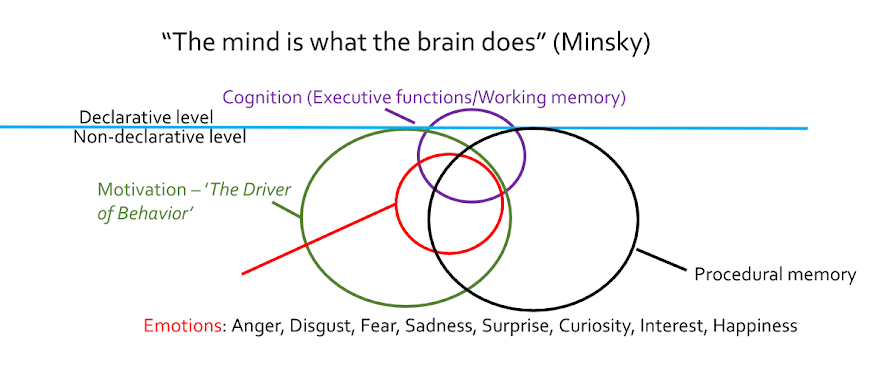Please support the blog via Swish (Sweden), MobilePay (Finland) or Wise.
For approximately ten years, there's been an increasing hype around AI, and for the past one or two years, everyone is talking about AI. And as always with hypes, it seems that many people believe that AI is the general solution for stuff, that is, a means to an end (a target).
But here's the twist or catch. It seems like:
- there's no target
- People in general don't seem to understand what AI is.
As both Karl Duncker (1903 – 1940) and Cecil Alec Mace (1894 – 1971) famously showed, probably influenced by the zeitgeist and people like Max Wertheimer (1880 – 1943), Henri Poincare (1854 – 1912), and Jacques Hadamard (1865 – 1963), before you start thinking about means (strategies to attain something), you should figure out what to attain – the target (Duncker, 1945; Mace, 1935).
But an equally important question to be sorted out is: what is AI?
In the 1940 and 50s, the cold war arose between the communist Soviet autocracy (1917 – 1991) and the western democratic world. As tension grew, both sides aimed to promote their viewpoint about how societies should be managed. And since the emergence of modern societies, likely during the Epipaleolithic or earlier, spying has always been the method to gather information about your neighbors or adversaries (Hodder, 2018; Pagel, 2019).
Long story short, in the late 1950s, the newly founded Central Intelligence Agency (CIA), founded Advanced Research Projects Agency (ARPA), later DARPA, for the purpose of speeding up generative learning and creativity to solve complex problems and to produce new technological innovations. That effort resulted in reconnaissance air crafts like U2 and the SR-71 Blackbird, Arpanet (internet), General Positioning System (GPS), as well as augmented computing and Artificial Intelligence, abbreviated AI.
The Dartmouth Summer Research Project on Artificial Intelligence is widely regarded as the birth of AI as a field. Organized by John McCarthy (Dartmouth), Marvin Minsky (Harvard/MIT), Claude Shannon (Bell Labs), and Nathaniel Rochester (IBM) (Chat Gtp).
In the 1960s, McCarthy set up Standford Artificial Intelligence Laboratory, with the goal of simulating human intelligence (Markoff, 2005).
Augmented computing means having a device that can help you with stuff – a personal computer or a smartphone. These have been available for public use since the mid 1980s.
“The mind is what the brain does” (Minsky, 1927 – 2016).Artificial intelligence, on the other hand, aimes at mimicking the mind's operational interplay within the brain.
But here's the catch, cognitive scientists and neuro-psychologists are yet to fully understand this interplay.
What is known is that the mind can be described as the interplay between PRIMES, which is motivation and emotions (Buck, 1985), and declarative and nondeclarative cognitive processing (Schacter, 1987; Schacter, Benoit & Szpunar, 2017; Schacter & Curran, 2000; Squire & Dede, 2015; Squire & Zola, 1996), or as the interplay between memory, perception, and prospection.
This is known as the executive functions, inclduing the ability to elaborate scenarios forward in time (Atance and O'Neill, 2001, 2005; Ardila, 2008; Ardila et al. 2018; Adornetti, 2016; Barkley et al. 2001; Coolidge and Wynn, 2018; Diamond, 2013; Diamond et al. 2011; Elliott, 2003; Jurado och Rosselli, 2007; Gallister, 2017; Gilbert och Wilson, 2007; Kaku, 2014; Liu et al. 2017; Moulton and Kosslyn, 2009; Pluck, Cerone and Villagomez-Pacheco, 2023;Schacter och Addis, 2007; Suddendorf, Bulley, and Miloyan, 2018).
Common knowledge among psychological scientists is that memory and perception interplay to form intentional scenarios forward in time (Gilbert and Wilson, 2007; Locke and Latham, 2002; Österberg, 2012), but that this process sometimes is interrupted by a cocktail of emotions, memories and perceptions, leading to mental fallacies - simulation bias (Baumeister et al. 2001; Kahneman and Tversky, 1977; Schacter and Addis, 2007). Ergo. AI is partly still in the making.
Another interesting observation is that AI-modules are integrated into augmented computers, that is, search engines, smartphones and so on.
Conclusion. AI is still in the making, there are till a few things to sort out before it's fully developed, and the projection for its use is likely as a complement to augmented computing. But in order for that to happen, a clearer target must be formulated.
Please support the blog via Swish (Sweden), MobilePay (Finland) or Wise.
More about my expertise:
Executive coaching for CEOs/managers and workshops to facilitate Organizational Performance, Learning, and Creativity for Problem Solving | Lectures: Nutrition for physical and mental health | Course/lecture: children's emotional and social adjustment and cognitive development | Language training - Swedish | Academy Competency | CV | Teaching skills and experience | Summary of research project | Instagram | Linkedin | YouTube-channel | TikTok | Twitter

No comments:
Post a Comment